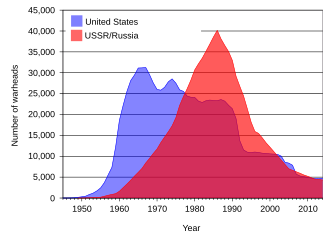Disarmament
Disarmament refers to the reduction or withdrawal of military forces and weapons. The term is often associated with the goal of reducing the number of weapons in a country's arsenal, limiting the types of weapons that can be developed, and decreasing the size of a nation's armed forces. Disarmament efforts are usually undertaken to promote peace, enhance international security, and reduce the likelihood of conflict. These efforts can be unilateral, bilateral, or multilateral, involving multiple countries working together through international agreements or treaties.
History
The concept of disarmament has been a part of international relations since the early 20th century, with significant efforts following both World War I and World War II. The League of Nations and later the United Nations were instrumental in promoting disarmament as a means to prevent war and ensure a lasting peace. The Treaty of Versailles, for example, imposed disarmament on Germany after World War I. Post-World War II, the establishment of the United Nations Disarmament Commission in 1952 marked a significant step towards global disarmament efforts.
Types of Disarmament
Disarmament can be categorized into nuclear, conventional, and chemical/biological disarmament:
- Nuclear disarmament involves the reduction or elimination of nuclear weapons. Key treaties include the Treaty on the Non-Proliferation of Nuclear Weapons (NPT) and the Treaty on the Prohibition of Nuclear Weapons.
- Conventional disarmament focuses on reducing conventional (non-nuclear) weapons, such as tanks, firearms, and missiles. The Conventional Armed Forces in Europe (CFE) treaty is an example.
- Chemical and biological disarmament aims at eliminating chemical and biological weapons. The Chemical Weapons Convention (CWC) and the Biological Weapons Convention (BWC) are significant treaties in this area.
Challenges
Disarmament faces several challenges, including verification of disarmament, the reluctance of states to reduce their military capabilities, and the need to ensure that disarmament does not compromise a country's security. Verification mechanisms, such as inspections and satellite monitoring, are crucial for the success of disarmament agreements.
Impact
Successful disarmament efforts can lead to a more stable and peaceful international environment, reduce the risk of accidental war, and free up resources for economic and social development. However, the impact of disarmament is contingent upon the willingness of countries to engage in good faith negotiations and comply with agreed-upon treaties.
See Also
This article is a global issues-related stub. You can help WikiMD by expanding it!
Transform your life with W8MD's budget GLP-1 injections from $125.
W8MD offers a medical weight loss program to lose weight in Philadelphia. Our physician-supervised medical weight loss provides:
- Most insurances accepted or discounted self-pay rates. We will obtain insurance prior authorizations if needed.
- Generic GLP1 weight loss injections from $125 for the starting dose.
- Also offer prescription weight loss medications including Phentermine, Qsymia, Diethylpropion, Contrave etc.
NYC weight loss doctor appointments
Start your NYC weight loss journey today at our NYC medical weight loss and Philadelphia medical weight loss clinics.
- Call 718-946-5500 to lose weight in NYC or for medical weight loss in Philadelphia 215-676-2334.
- Tags:NYC medical weight loss, Philadelphia lose weight Zepbound NYC, Budget GLP1 weight loss injections, Wegovy Philadelphia, Wegovy NYC, Philadelphia medical weight loss, Brookly weight loss and Wegovy NYC
|
WikiMD's Wellness Encyclopedia |
| Let Food Be Thy Medicine Medicine Thy Food - Hippocrates |
Medical Disclaimer: WikiMD is not a substitute for professional medical advice. The information on WikiMD is provided as an information resource only, may be incorrect, outdated or misleading, and is not to be used or relied on for any diagnostic or treatment purposes. Please consult your health care provider before making any healthcare decisions or for guidance about a specific medical condition. WikiMD expressly disclaims responsibility, and shall have no liability, for any damages, loss, injury, or liability whatsoever suffered as a result of your reliance on the information contained in this site. By visiting this site you agree to the foregoing terms and conditions, which may from time to time be changed or supplemented by WikiMD. If you do not agree to the foregoing terms and conditions, you should not enter or use this site. See full disclaimer.
Credits:Most images are courtesy of Wikimedia commons, and templates, categories Wikipedia, licensed under CC BY SA or similar.
Contributors: Prab R. Tumpati, MD





